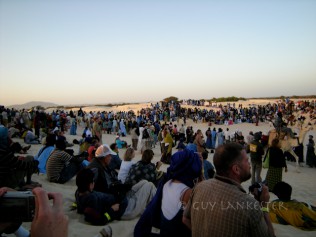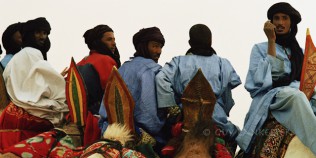As an ambassador for peace, internationally known Malian artist Oumou Sangaré will lead a stalwart line-up of African musicians in one of two caravans that make up the 2013 Festival au Désert in Exile. An international music event that draws thousands of people annually to Mali, the Festival au Désert (Festival in the Desert) was forced into exile when its home in the northern city of Timbuktu fell to a coalition of Islamist and Tuareg nationalist rebels. After a military coup in March 2012 the Saharan branch of al-Qaeda seized control of Tuareg-dominated northern Mali and established a harsh form of Islamic law that, among other things, punishes the creation and enjoyment of music.

Despite this, festival organizers refuse to submit to the threats of extremists, as National Geographic reports. “[W]e do not want to nor can we allow ourselves to become resigned because safeguarding the values of the Festival, i.e. those of peace and tolerance, now more than ever has become an absolute emergency. This is the message we want to pass among ourselves first and then to others throughout the rest of the world who share with us the same values,” the organizers say.
To this end, in February the festival’s 13th year will gather Malian, African and international artists in the new location of Oursi, Burkina Faso. In addition, the Festival au Désert will travel as a “Caravan of Artists for Peace and National Unity,” giving performances at the Festival on the Niger in Ségou and the Festival of Mali in Bamako.
The instability in the north has also led to a dramatic drop in tourism to Mali. Though northern Mali and parts of the Sahel region have been considered unsafe for travel for some time due to the threat of kidnapping, recent tourist abductions, added to extreme oppression enforced by the occupying rebels, have greatly impacted the tourism trade and the livelihoods of many Malians.
In a recent e-mail to Ethical Traveler one Malian living in the north called the situation “so difficult” and said he sees “no hope” for the next five years. His tourism business lost all its bookings within a week of the widely reported kidnappings of several foreigners in November 2011, and hotels, travel agencies and many restaurants in the region remain closed.
The festival organizers are promoting international participation but are discouraging travelers from trying to reach the festival on their own. Guy Lankester, owner of From Here 2 Timbuktu, is one of the few tour operators who will be organizing trips to the 2013 festival. With seven years of experience in the area, Lankester relies on local solutions and knowledge to assess security risks, with a 100-percent success rate. He recently traveled the festival route through Mauritania, south Mali and Burkina Faso to assess the security situation on the ground, and says he felt as safe throughout his journey in Bamako and across the region as he always has. To Lankester’s mind, the Islamist invasion of northern Mali has increased concerns for the local people but has arguably made travel safer for tourists in the region beyond the Islamists’ control, where the caravan takes place. The recent kidnapping of a French citizen in southwestern Mali, however, does indicate that the extremists are now reaching into areas once considered safe.
According to Lankester, one of the main benefits of travelers’ attending the festival is that locals will see others from foreign lands coming to join them in their time of crisis. He explains, “For all Malians—Tuareg, Bambara, Bozo, Fulani, Songai and Dogon—the stranger is the most valued in the community. On my recent trip to Mali, a Tuareg friend in Bamako, who works for the ministry of tourism, said to me, “When there are no tourists it is like you have your eyes closed. No one sees your soul; you are alone.'”

Music is central to Malian culture and the current religious war against music is drawing some international attention, in large part due to the efforts of Malian musicians who continue to sing and speak out against the atrocities that are occurring in their country.
A new film project, Sahel Calling, will be following the Festival au Désert’s musical caravan through Mauritania, Mali and Burkina Faso to document the story of the musicians who are calling—through song and music—for an end to human rights violations. The goal of the project is to inspire a global audience to take action in demanding remedies to this humanitarian crisis.
The crisis and sociopolitical conflict in Mali and the Sahel region is immense. According to the United Nations, an estimated 4.6 million people remain at risk of food insecurity in Mali and over 450,000 Malians have fled the north, with about half seeking refuge in neighboring countries. Proceeds from the Sahel Calling film project will go towards Oxfam’s West African Emergency Program, United Nations Refugee Programs and Instruments4Africa’s Aid 2 Northern Artists Program.
The spirit of the Festival au Désert, in exile, and efforts such as Sahel Calling, is perhaps best captured by in the words of Oumou Sangaré, who said: “Mali and its music embody the symbol of a free and victorious Africa.”
Visit the Sahel Calling website for more about the project and how to support it, or follow their Facebook page for daily updates on the situation in Mali.
Read Ethical Traveler's Reprint Policy.
